Childhood is one most remarkable phases of your kid’s life. This is the time when they start having a rush of emotions and don’t understand how to handle or identify them. However, as parents, it is your responsibility to help your kids and motivate them to try some something new. Music is one such new element which your kid might be reluctant to try at the beginning.
But trust us, with the right boost of motivation, you will soon find them get a hang of it and enjoy their musical instruments like never before.

You have to communicate with them and help them identify the right ways to express their emotions through music. This will not only develop their taste for music but will also make them emotionally stable and will prevent all kinds of behavioral problems.
So, if you want your kid to be a music enthusiast, good human being and if you want them to feel better about themselves, it is extremely necessary to help them with the right dose of motivation. Here are a couple (more, actually) of guidelines that’ll help you to motivate your little ones like never before.
Helping Your Kid to Understand the Gift of Music
Well, this is the first thing that you need to do in order to motivate your little ones to learn a new musical instrument. Show them that learning to play an instrument is a privilege which is not available for everyone they come across. So if they’re coming across such an opportunity, teach them to seize it and make the most out of it. Likewise, also take a note to help your kids develop a liking for music from a very young age.
Being Sensitive to Your Kid
Yes! You can ‘actually’ make your kids feel better and improve their practice sessions by being sensitive. Observe your little one’s behavior and listen to whatever he has to say. If your child cannot express his feelings verbally, encourage him to show gestures and tones that will help you identify his mood.

Accept the feelings of your child and help him understand the subtle intricacies of music. Motivate him to try. Even if he is reluctant at the beginning tell him that trying won’t do any harm. This will be inherent in the development of his emotion and personality in the long run. On top of that, this will also end up as a motivational boost helping you to practice your little ones, better sessions of music.
Encouraging and Positive Feedback
Kids love encouraging words and praises, and this factor has a sterling effect on their musical practice. If you constantly criticize them and expose their flaws, they will feel bad and lose self-confidence. Thus, to trigger their positive emotions you have to be encouraging with them. No matter whatever small improvement your kid makes, encourage him to do that and give him positive feedback if he does it well.
If something goes wrong and your kid is unhappy, console him and teach him the basic lessons of life. Instead of asking him to compete with others, ask your kid to concentrate more on his performance and compete with himself. This positive behavior will play a significant role in developing your kids’ emotions.
Providing Kids the Opportunities to Practice Independently
This is another major factor which can improve your kids, musically. Right from their childhood, try to make your kids independent. Encourage them to do things on their own. This will help in developing their problem solving abilities but will also help them practice better. Thus, your kid will be able to cope, even in the worst of all situations.

They will feel independent and good about themselves while handling the little musical activities alone. However, while giving them the opportunity don’t forget to keep a close watch. Help them practice and if they can’t do anything even after trying, always encourage them for trying.
Spending Special Moments with Kids
With the hustle and bustle of our lives, it becomes pretty difficult to keep pace with the kids. But if you want them to motivate them for their musical lesions try to spend some special moments with them. Talk to them and engage in any activity, which both of you love. This will foster their emotional development and the relationship between you and your child.
All in all, follow these guidelines to motivate your kids to practice some good music. These tips will surely help them get rid of all behavioral and emotional problems and they’ll soon enjoy music as much as you do, perhaps even more.
Featured Image: Image Credit
Practice time ?? Vibe with me on Snapchat: akstreetgoddess ?https://t.co/wb1jkvtX3e
— Alicia Keys (@aliciakeys) June 9, 2016
Practice makes you better, not perfect.
— Patama Posts™ (@PatamaPost) June 7, 2016
Related Articles:
Motivating Your Child to Practice.
It’s the question teachers get asked the most: “How do I get the kids to practice?”.More often than not, it is not the practice that children hate, it is the negative associations that come with practice. These negative associations often come from the notion that in order for music lessons to be a success, students need to contribute long hours of methodical practice in order to reach a certain goal. Whilst placing goals are important, let’s not forget that if practice and ‘the journey’ are not enjoyable it is likely that your child will be give up on themselves long before the destination is even realised. Via Music Central
5 Effective Tips To Help Motivate Your Child’s Music Practice
// We all know that doing things consistently in life is a BIG challenge, below are 5 tips to help you stay motivated.
1. Make a poster for your overall practice goal and the steps necessary for achieving the goal
Having a visual of a big goal with smaller steps on how to achieve it makes an insurmountable task doable. If a step feels too big, break it down into smaller steps. Breaking down overwhelming goals into doable steps is an extremely important part of practice. Via Songbird Rising
Piano Practice Guides For Motivating Students- Free Resources
Have you ever wondered how a student’s practice diary or assignment book can best support their development as a musician or if there’s even any point in writing things down each week? Have you ever wondered if there are better ways that you can guide your students to practise effectively during the week?
Many of us write notes in students’ books without much thought about whether this will actually help their practice, if they agree with the goals we set, whether they can even read our handwriting (!) or if it’s actually more of a reference for us to remember what they did last lesson! Via Timtopham


